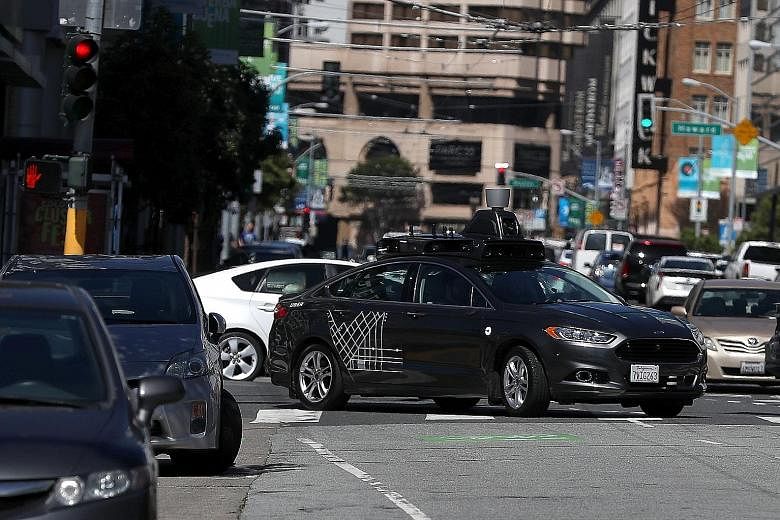SAN FRANCISCO • Uber Technologies has said its self-driving sensor technology was "fundamentally different" from Waymo's, blasting the Alphabet unit's claim that it profited from stolen files in the race to roll out the first driverless car.
Uber said in a federal court filing last Friday that 14,000 of Waymo's computer files on autonomous technology never ended up on its servers, despite Waymo's claim that its then executive, Mr Anthony Levandowski, had stolen them before joining Uber.
Waymo sued Uber in February, seeking an injunction to stop it from using trade secrets and other intellectual property at the centre of the case. Waymo said Uber was able to quickly scale up its autonomous drive after Mr Levandowski downloaded the files before his departure to form a company that Uber then acquired.
In question is a key component called lidar - for light detection and ranging sensors - which helps a self-driving car navigate.
Uber said it started designing lidar for its own autonomous vehicle before hiring Mr Levandowski as its head of self-driving cars. Uber said its lidar system is significantly different from Waymo's.
For example, Uber said, it uses four lenses, while Waymo has a single-lens design.
The rivals are vying to bring self-driving cars to the masses in a field that includes established carmakers, little-known start-ups and major technology companies.
"The record shows Uber never possessed - and never used - any information Mr Levandowski allegedly took from Waymo," Uber wrote in its filing.
Mr Levandowski, the central witness, has sought his Fifth Amendment right against self-incrimination and will not testify, over concerns about the possibility of a criminal case being filed.
He has not handed over the allegedly stolen documents, and Uber, which has never denied that he took the files, claims it cannot force him to do so.
US District Judge William Alsup in San Francisco has ordered Uber to do a more thorough search of its computer systems to see if the documents are in its possession.
"You haven't searched well enough," he told Uber's lawyer.
Judge Alsup also suggested that Uber had leverage over Mr Levandowski it had not used, such as threatening to fire him should he not hand over the documents.
Meanwhile, a court in Italy on Friday banned the use of smartphone apps for the ride-hailing group Uber, saying they contribute to traditional taxis facing unfair competition, local media reported.
In a ruling subject to appeal, the court in Rome upheld a complaint filed by taxi unions and gave Uber 10 days to end the use of various phone applications on Italian territory, along with the promotion and advertising of them.
Uber said it was shocked by the ruling and would appeal immediately.
REUTERS, NYTIMES, AGENCE FRANCE-PRESSE

